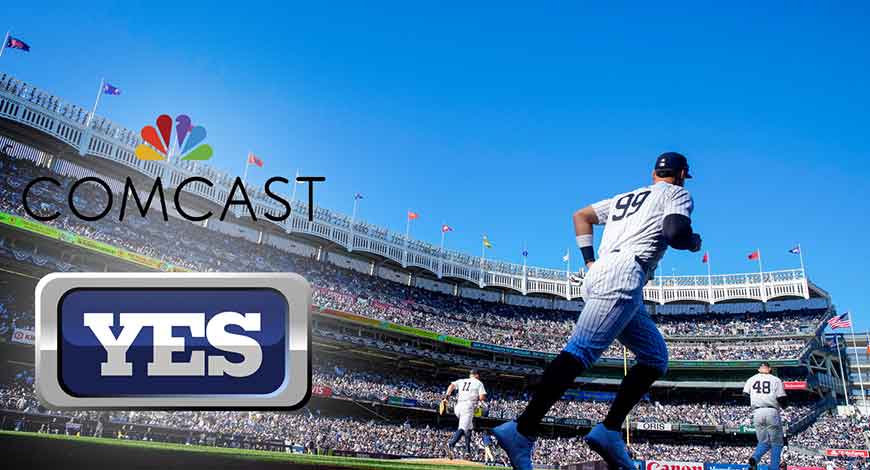Five months after Comcast and the YES Network called a truce of sorts in their carriage dispute, the Yankees’ TV network has returned to public view in recent weeks, with their temporary extension expiring at the end of the MLB season.
Before Saturday’s Yankees-Red Sox game at Yankee Stadium, Federal Communications Commission chairman Brendan Carr threw out the ceremonial first pitch. The 36th chairman of the agency also joined the YES broadcast booth for an interview during the bottom of the 2nd inning, discussing his love for baseball and his interest in sports.
While far from the first government official to take part in the ceremonial honors, Carr’s appearance at the stadium is significant given his role in the lingering dispute between YES and Comcast.
Back in March, the two sides made an 11th-hour agreement that kept the YES Network, also home to the NBA’s Brooklyn Nets, on Comcast’s Xfinity basic tier. Just before that deal, YES general counsel Derek Heuzey filed a formal program carriage complaint to the FCC. (The FCC does not regulate what cable companies charge consumers and networks.)
Though the agency did not respond to the complaint, Carr himself addressed the impasse on social media, posting that “I would encourage a quick and favorable resolution for the benefit of everyone” and that the FCC “does have authority to step in and address claims of discriminatory conduct,” without providing further details.
The dispute came back into the discussion thanks to a July 16 op-ed for Politics NY by Tosha Miller, the president of the New York City Black Chamber of Commerce (NYCBCC); she centered the impasse in her discussion about President Donald Trump’s combative history with the Black community in the city and across the country.
Miller singled out team president Randy Levine due to his longstanding relationship with the president. “So it’s no surprise that when YES Network didn’t get what it wanted from the market,” she wrote, “it turned to Trump for help. Worst of all, the deal that was pushed through isn’t just unfair, it hurts regular people by forcing them to subsidize YES Network broadcasts—whether they watch the Yankees or not.”
Levine responded through amNY on July 29, alluding to a quid pro quo between the NYCBCC and Comcast. By dissecting the chamber’s finances in public records and mentioning Miller sharing “a very positive story” from a Comcast executive on LinkedIn, Levine suggested that the operator could have contributed to the NYCBCC for submitting the critical op-ed.
The Yankees president argued that SportsNet New York, the RSN home of the New York Mets, is being spared from Comcast’s tier reassignment because the operator has an ownership stake in the channel. (Comcast’s NBC Sports Group owns 8% of SNY.) Levine dipped into the Yankees/Mets fan rivalry by saying that keeping SNY on basic cable would mean that Mets fans would pay less to see their team than Yankees fans would to see theirs.
“When you ask Comcast to explain why this is fair, they are dismissive and show no regard for YES and Yankees’ fans,” Levine wrote. “Instead, Comcast often uses its corporate muscle to Comcast’s advantage against independent programmers.”
It’s worth noting Comcast moved NBC Sports RSNs it owns in Boston and northern California to the higher tier after the expiration of their carriage deals. The Philadelphia channel remains on basic cable. Additionally, SNY’s distribution deal with Comcast, one made by former Mets owner Fred Wilpon (who still owns the network), does not expire until 2035.
YES Network declined to comment. Comcast didn’t respond to a request for comment.
Across its national footprint, Comcast has been pushing regional sports networks out of its basic cable tier into the pricier Ultimate TV package, which would cost subscribers $20 more per month. The company has taken this strategy in hopes of slowing down declines in cable subscriptions, believing that it could lower cable bills for customers who don’t watch regularly sports.
Comcast’s Xfinity cable service does not operate in New York City itself, but it does throughout northern New Jersey, the lower Hudson Valley, parts of western Connecticut and a sliver of northeast Pennsylvania. MSG Networks, another NYC-based RSN group that carries the New York Knicks and the region’s three NHL clubs, have been blacked out for Comcast customers since September 2021.
Cable-based RSNs are not the only channels in the crosshairs of Comcast. Broadcast channels must have retransmission agreements with cable and satellite operators to be carried in those systems.
Chicago Sports Network (CHSN), an over-the-air sports channel, came to an agreement with the operator in June, well after the end of the Bulls’ and Blackhawks’ seasons. Scripps’ KPUX Channel 16, which carries Utah Mammoth games, remains blacked out for customers as the team prepares for its second season in Salt Lake City.
YES partners with Sportico on a monthly sports-business program, Sportico Sports Business, that is carried by the RSN. Sportico
